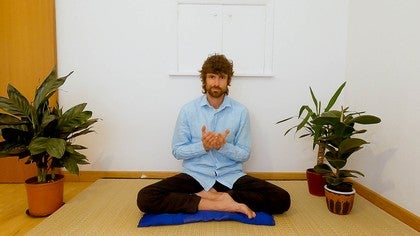Description
About This Video
Transcript
Read Full Transcript
Sutra 243 continuing to talk about the fruits of the Neama. So his potential is also reaffirming this prax of Pratipaksha Barvin and the benefits of being established in the Niyamas. And he says, So from tapas, they're infused, this shyered this removal of the impurities of the vehicle, and then comes the perfection or completion or attainment of its true powers. So the idea from tapas which means to heat to warm, that can be brought about this purification of this bodily vehicle and all its instrumental powers. This reminds us, remember back when we spoke about sculpture, spoke about the example of the bicycle.
When all the different cog's wheels and parts are aligned, then that system can move with minimal inflammatory friction, and it can operate with maximum efficacy and smoothness. So James idea here is that when we bring with steady regularity, this light of balanced clear yogic awareness into everything that we do and steadily, steadily. We work respectfully with this bodily vehicle to fine tune it to bring into greater harmony and balance. Then it's able to serve its true ultimate purpose, which is to carry us all the way to Moksha, to liberation. Tuppas, it means heat, it means fire, but we need the vehicle to carry us all away.
So tapas, sometimes people think of tapas as kind of austerity or asceticism. However, it is said in the upanishads, this is not a direct quote, something of a paraphrase. No point arriving on the doors of final liberation with the vehicle so trashed that we cannot cross over into that state of ultimate freedom. So, yes, tapas means fire. It means heat, but this is yoga. So it's a balanced heat. Yes. It's a fire of constant, steady yogic discipline that helps us stay centered, balanced, and clear helps us see more readily.
Also, when we talk about asceticism or austerity, people might hear, for example, of certain yogis who dwell in the Himalayan hills or even higher up into the mountains. And all they have is a piece of cloth, and they subsist mainly on air and prana, and their life relative to us looks rather austere. And then there are other people who are considered great yogins who live relatively speaking in the lap of Luxury. But Tapaha, what does it really mean? It is the fire that nourishes that James, that purifies. It's not the fire that destroys or raises. Yes.
It will destroy impurities but in order to help things come into their fullest state of their true potential. One person's opulent luxury is somebody else's asceticism. For example, my place in India, the floor is hard. It's actually a marble floor and there is nothing in the room. I just have some straw mats, and I love that space.
For me, this is luxurious. But my sister recently moved house, and one of the first things she bought this before she even moved house, she bought a sofa. She liked she and her partner. They like the sofa is an important part of their life. There's no sofa in my house in India.
There's no furniture at all. That I like that. That's luxurious for me, but it seems ascetic or osteo to somebody else. So just like everything else in yoga, one person's food, another person's poison. Anything and everything can be medicine, anything and everything can be poison.
It all depends on the situation, the constitution, and the dose. So, when we are working with that fire of yogic discipline, we have to tend it to make sure It is nourishing us and really helping the whole system function more effectively bringing us into more balance. Remember, the first of the James and the yamas was Ahinssa. So this also relates to the way that we apply the fire of yoga practice into our lives. We don't want to be burning ourselves out. We don't want to be trashing the vehicle.
Rather, steadily, we work with the vehicle, respectfully, to help it do the job it really wants to do. Which is to be able to come and rest in that state of full recognition of the underlying essence, which is allowing it to have any experience at all. So top of her, from top of her, brings this purification of the system, and that allows the vehicle to actually reach its deeply longed for destination. One more thing to say about the sutra, when we talk about the perfections or the culminations of the Kaya, the bodily vehicle, and the Indriaja, the sense and action powers. And Vyasa mentioned this in the commentary, this can also cannote and suggest the ideas of these cities.
The capacity to make ourselves minute or gigantic the capacity to see or hear at the distance, for example. These things can occur along the way. But the idea is we're not pursuing those attainments. The idea is that those attainments will just help fine tune our understanding of the vehicle to actually take us to that place beyond desire. So if we're thinking, oh, if I do some more tapas, then I'll be able to read people's minds and I'll be able to teleport myself and all this.
If I get infatuated with these attainments, What am I gonna get bound? I'm gonna reinforce my bondage, and what's the purpose of the vehicle to carry me to freedom? So, yes, as we work with that diligent fiery yogic centered awareness, it's altogether quite likely that we will gain access to things we did not have access to in the past in terms of our own power, our own capacities. We will recognize more of them. And so the recipe stays the same. Let us work with what is for the sake of uhinsa, for the sake of harmony, for the sake of yoga, for the sake of balance.
Yoga Sutras of Patanjali: Yamas and Niyamas
Comments
You need to be a subscriber to post a comment.
Please Log In or Create an Account to start your free trial.










